Graham Reid | | 8 min read
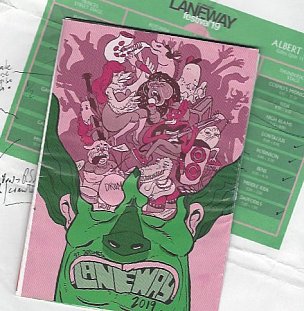
Many decades ago when the Rolling Stones came to Auckland and I was editing the entertainment pages of the New Zealand Herald I had what I thought was an inspired and amusing idea.
Rather than me review the show, why not send some writer who was decades beyond their demographic to see what he -- and I had someone specific in mind – made of the whole circus?
The person I was thinking of was in his cynical 60s, had spent most of his working life in London so was certainly aware of the Stones and their importance (if not much of their music) and he had a nasty humour along with a jaundiced eye.
The only problem was sobriety. This would be an event where you'd have to queue for drinks and my man would refuse to do that. So he would have to endure the event sober . . . not a state he was either familiar or comfortable with in my experience.
So the idea was dropped.
But I remembered it when I got on the bus to go to this year's Laneway festival in Auckland's Albert Park on a bright Anniversary Day where the temperature would shift effortlessly into the 30s.
I had – the whole sobriety thing aside – become that outside observer, someone way beyond the target demographic of the artists and audience (I don't recall seeing anyone there visibly older than me, most were younger than my children). But, I would hope, not as cynical.
Having only missed one Laneway in the past, been at literally many, many hundreds of concerts and familiar enough with about half the acts on the bill I figured I could undertake this one in good spirits . . . and with a few cold beers.
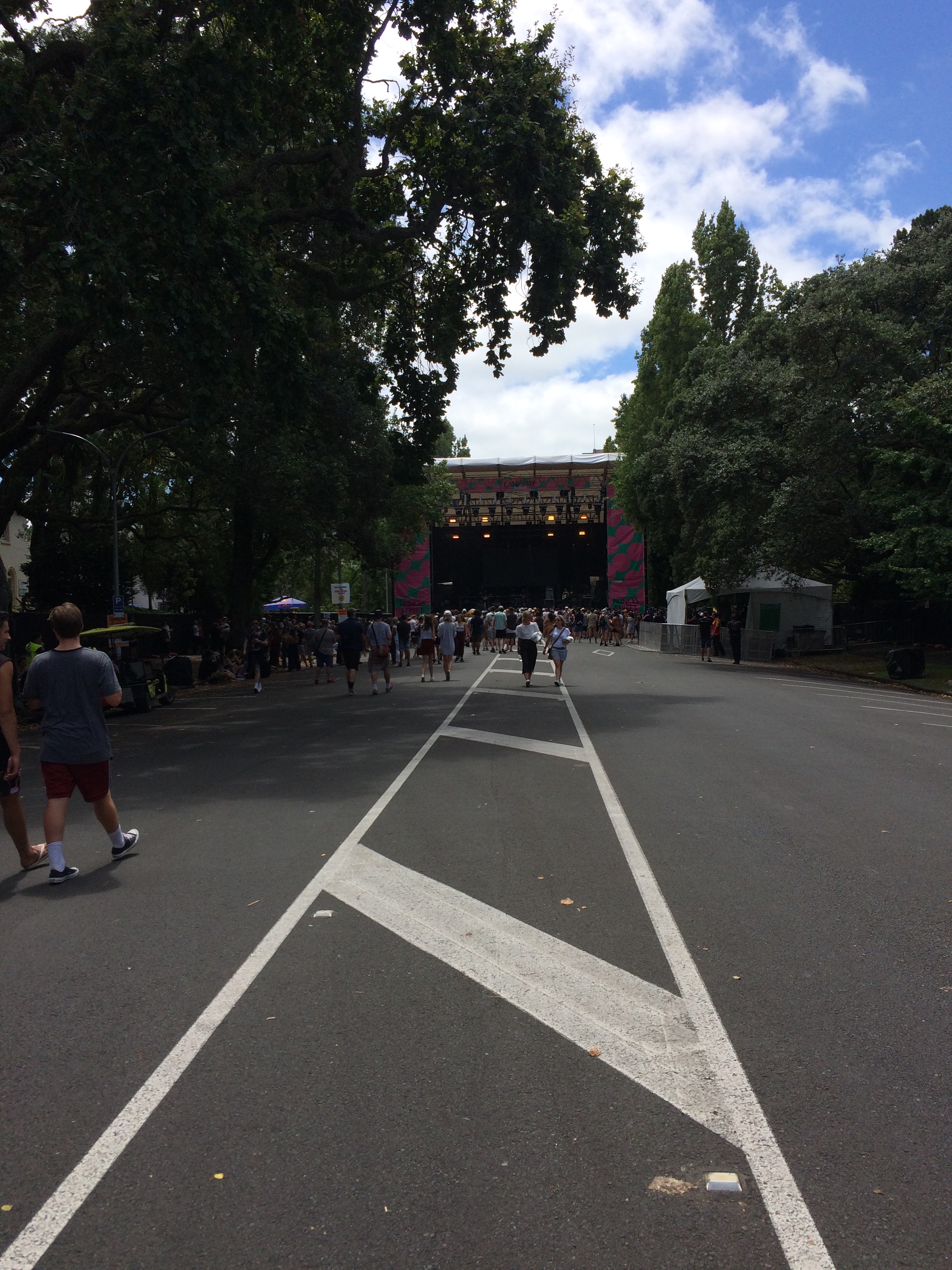 It was a great day out, but it wasn't to be my day as it turned out.
It was a great day out, but it wasn't to be my day as it turned out.
I like to arrive early for such festivals because sometimes the opening acts are as good if not better than the headliners, perhaps because they are more grateful to be included and feel they have more to prove so they try harder.
I wasn't disappointed: locals Imugi and Miss June could not have been more different but each staked a claim to further attention.
Before a Korean flag and with two Bez-like female dancers,Imugi – singer Yery Cho and beatmaker Carl Ruwhiu – delivered a thoroughly enjoyable and somewhat familiar set of dance-pop. Their slower songs set them apart however – peppered by witty comments and a genuine enthusiasm. They might not have been much different from the K-pop I've heard and picked up in Seoul over the years but they certainly had that point-of-difference in the context of this Laneway.
Well worth seeing.
Miss June – a raw and righteous Auckland quartet – adopted a take-no-prisoners approach and were thrilling. Singer Annabel Lidell may not have had much voice left afterwards but you couldn't deny her furious commitment to powerful material, which seemed located along the thrashing line between Romeo Void and angry Patti Smith. At the end she didn't so much “drop the mic” as discard it with a dismissive toss.
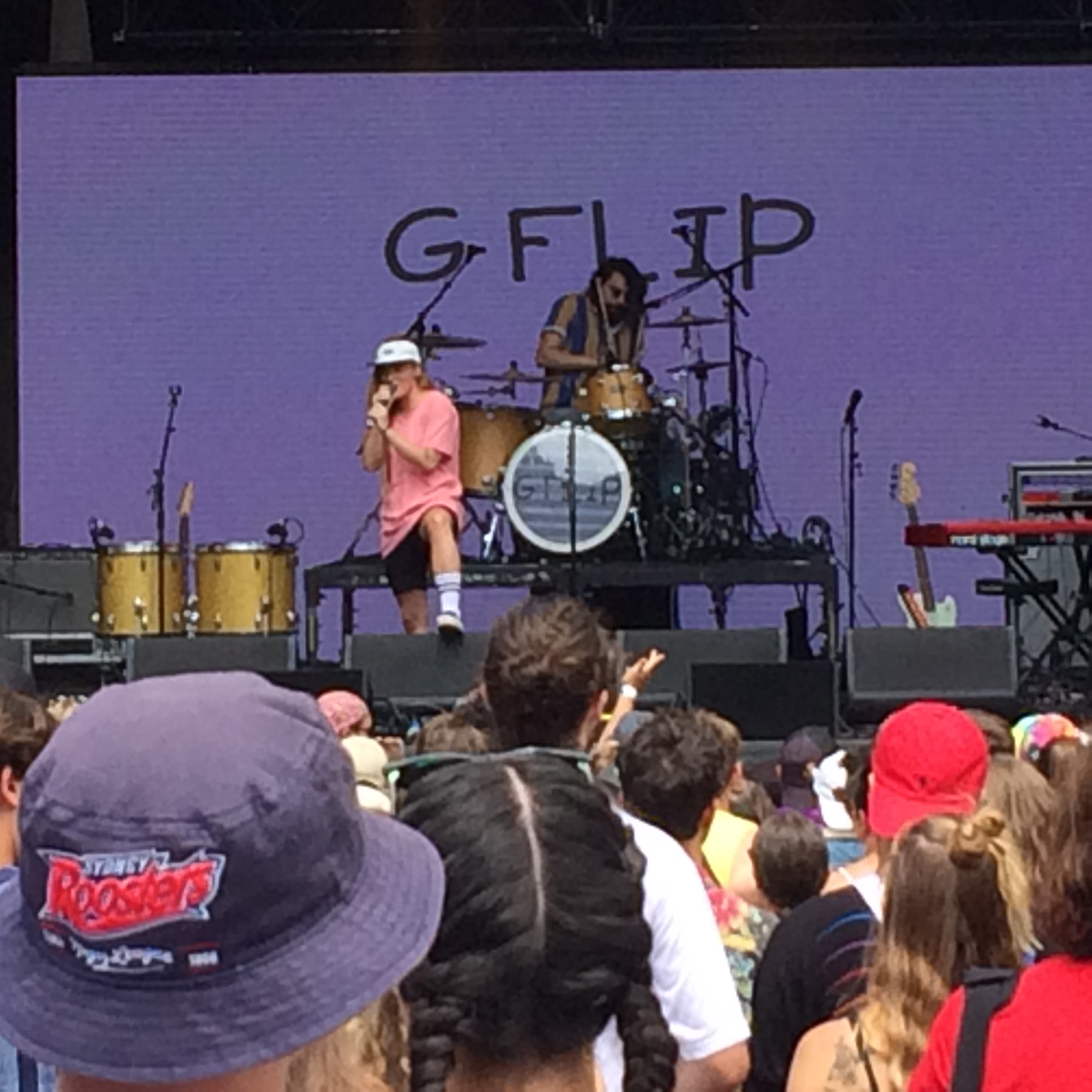
She opened sitting at the drum kit and hammering out what acted like a crowd-pleasing mixtape intro then took the mic for a standout set – backed by a drummer and bassist/acoustic guitar player – which boiled with enthusiasm and fun. As with all these early acts she expressed appreciation to those who'd turned up early to see her and, although I didn't stay for the whole Laneway – as we shall see – G Flip was a standout. And she might even make tube-socks fashionable again.
So far so good.
Locals Daffodils have established a sound following, although their output and appearances have been few - but on the Thunderdome stage down the tree-lined lane beside the Uni library they were accomplished and professional . . . although my pal and I agreed they sounded like they'd grown up on their parents’ record collection (Smiths, Joy Division, early Cure).
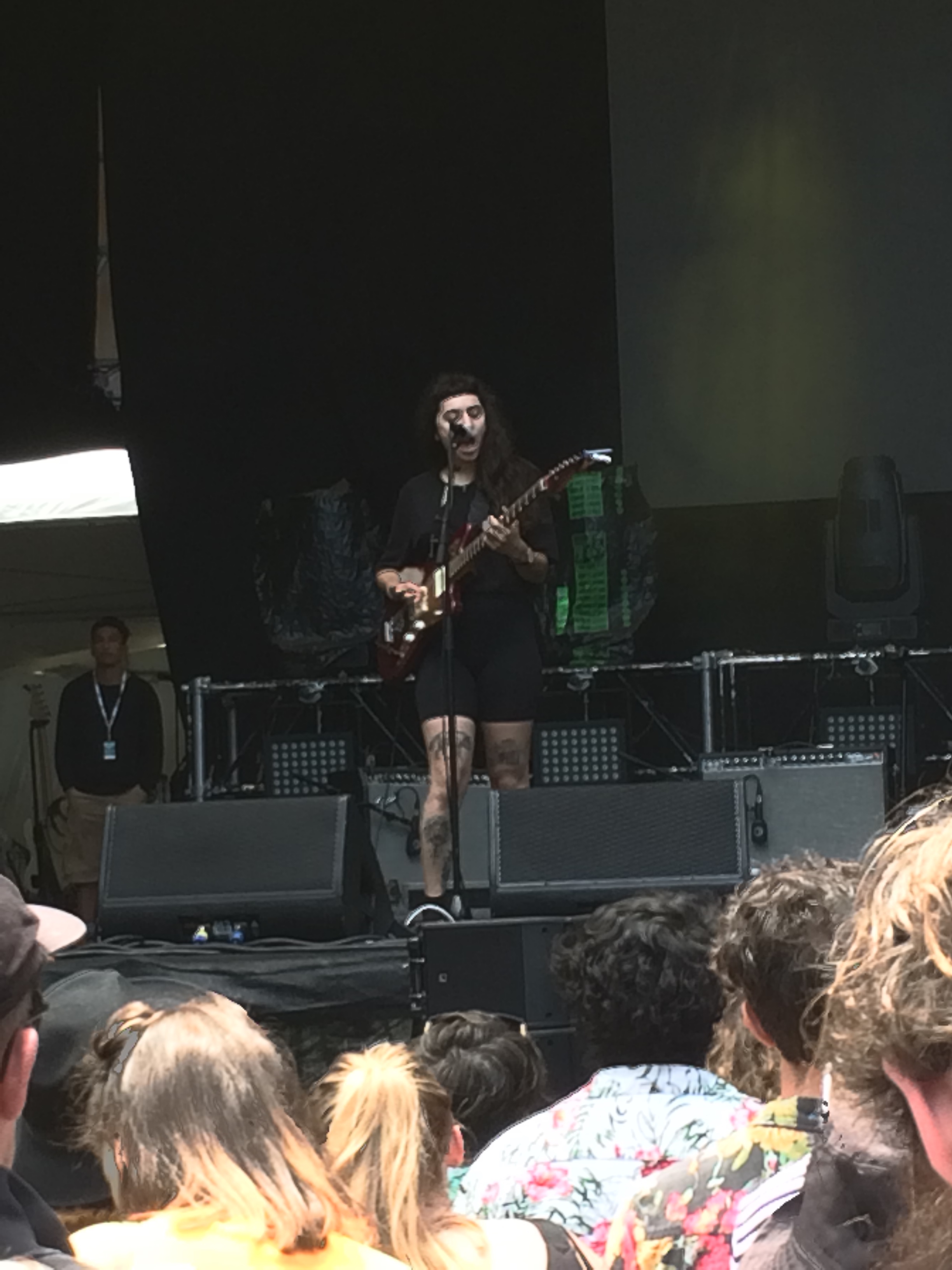 They were contemporary pop from about 1983.
They were contemporary pop from about 1983.
Australia's Camp Cope delivered a fairly monochromatic set of minimalist rock and – as that Daffodils comment hints – brought out some early skepticism. (Cynicism could follow.)
I observed that there might be a dozen older Flying Nun band members in the audience looking at them and thinking, “I wish we'd had a better singer”. Camp Cope didn't but she was at least powerful enough, if of very limited emotional and vocal range.
The early star however was Ravyn Lenae from the US whose slick hip-hop r'n'b set found her backed by an excellent band (I suspect some jazz school grads in there) and pulling a knowledgeable crowd to the Rotunda stage (the hottest SRO area). She also seemed to have a fairly large gay following and hers was a set which, while impressive, would have been more enjoyable, intimate and persuasive in a club setting.
Local girl Bene has a following and I had heard very good things but frankly was underwhelmed despite her best efforts, but then I am aware she doesn't make music for me.
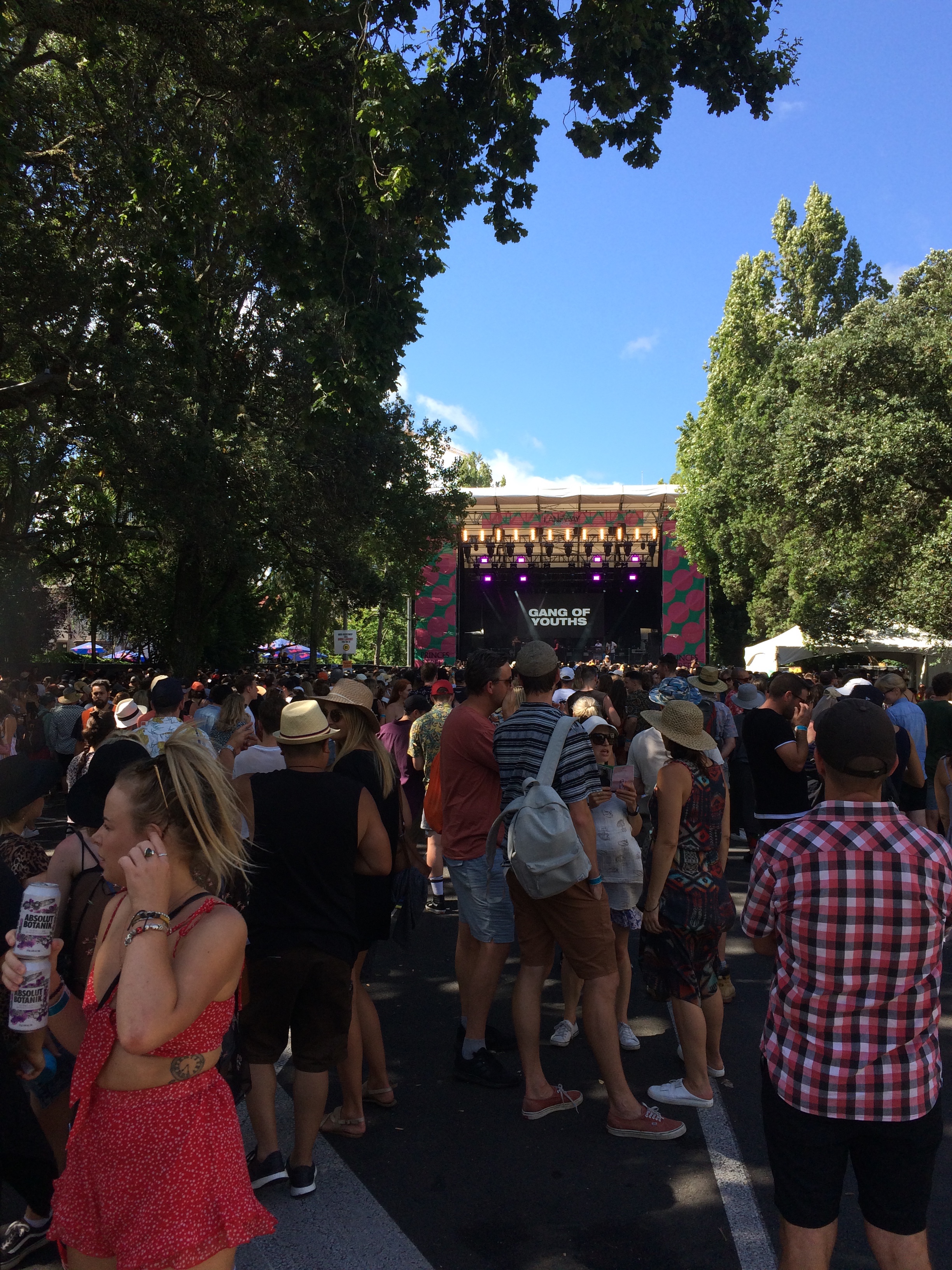 That said, as with Robinson who suffered even more from this, the young audience she drew seemed more interested in talking/shouting among themselves than listening.
That said, as with Robinson who suffered even more from this, the young audience she drew seemed more interested in talking/shouting among themselves than listening.
That same audience – aside from maybe the first four/five rows back from the front – largely ignored Robinson (other than to applaud at the end) and her cover of I'm On Fire until her final song (The Hit) and then the place went off. She was fine and deserved better.
I increasingly wonder about the purpose of festivals and people's expectations of them.
For me they are an opportunity to not just see artists whose music you have followed but to discover others. My guess is that artists can see them as an opportunity to connect with their fanbase but also try to win over new followers.
But over the decades what I've witnessed is a lack of surprise on stages.
No one seriously expects a guitar-burning Hendrix anymore (we wish) but most artists are defined by and remain within their genre. They have their codified tropes (if I hear “make some fuckin' noise” it might come from me crushing my water bottle in anger) and the audience slavishly accept and expect that.
And not a lot more.
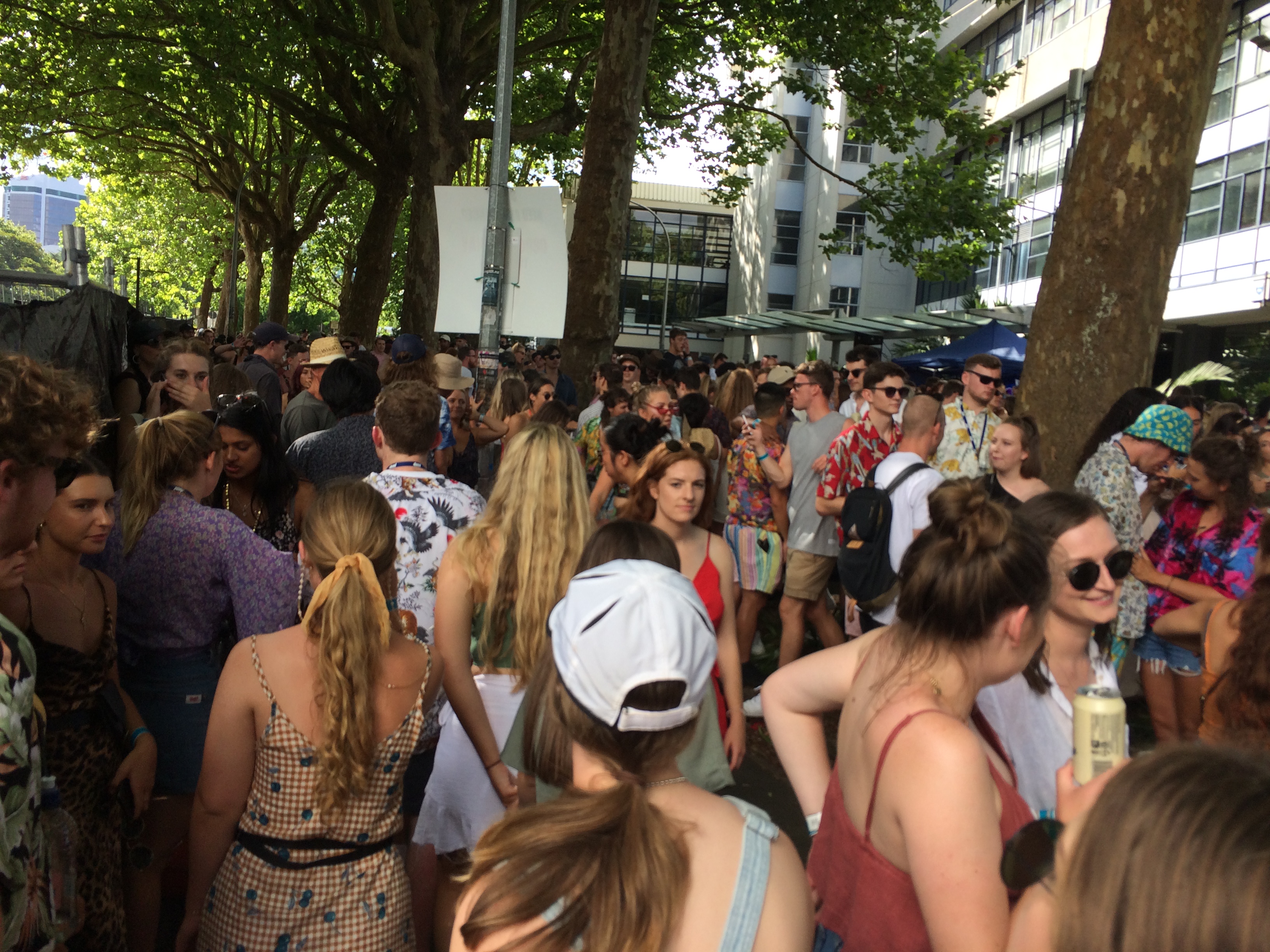 Most performers don't have the capacity to surprise, and nor it seems do they want to. And far too many have no real understanding of the dynamic of an outdoor festival.
Most performers don't have the capacity to surprise, and nor it seems do they want to. And far too many have no real understanding of the dynamic of an outdoor festival.
Britain's Rex Orange County for example seemed to think that on a stinking hot afternoon when their audience was sweating and some getting a wee bit worse for wear that this was the ideal time for two long self-indulgent solo spots which would have seemed more at home at a finger-in-the-ear folk festival. It was a drag.
Gang of Youths from Australia delivered standard and serviceable rock'n'roll but they too lost momentum . . . and frankly they come off as a bunch of downers.
New York's A Boogie Wit Da Hoodie's set was much anticipated out of curiosity because his recent album topped the US charts - and it was fine. He did exactly as expected and that crunching sound you heard was my water bottle.
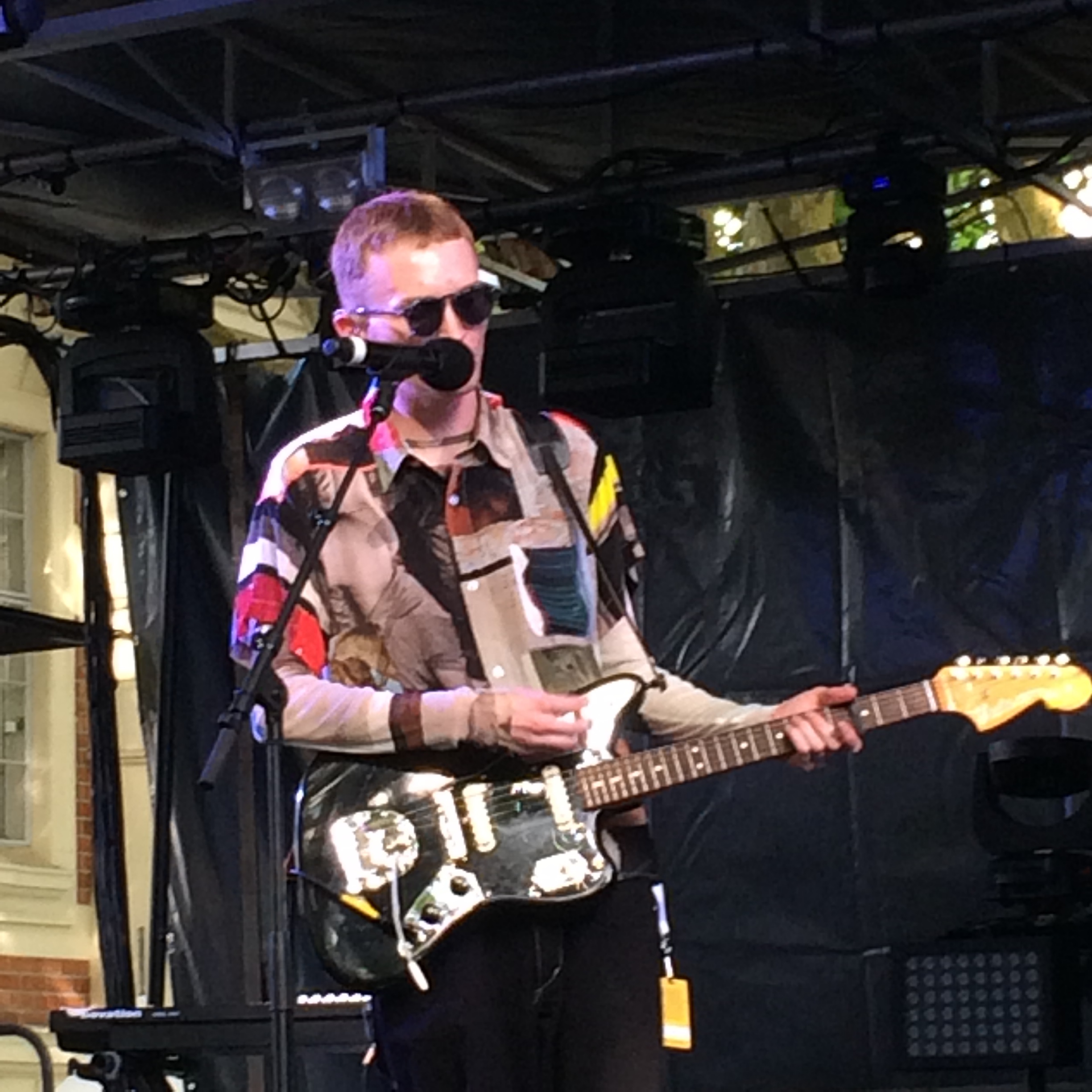 Regrettably I missed the Dead C (and that I genuinely do regret) but I made a point of catching Lontalius who interests me because he hasn't lived in New Zealand for a while and seems to be making quiet in-roads in LA with his aching folk-pop with dance inflections.
Regrettably I missed the Dead C (and that I genuinely do regret) but I made a point of catching Lontalius who interests me because he hasn't lived in New Zealand for a while and seems to be making quiet in-roads in LA with his aching folk-pop with dance inflections.
He is also overtly gay and so pulls a specific audience, and I was curious to see if that is growing or he is reaching beyond it. The evidence on the day was that he pulled a decent and very attentive audience (although I did joke that he needed to add in a chorus at times, and my opinion was important because I was his target audience!)
That he kept the attention of people was to his credit because most artists couldn't.
And what became increasingly clear as the day wore on and people peeled off for shade and rehydration-by-beer was that in fact the music – for many there – was incidental to the event itself.
As someone not quite cynical yet, I'd observe this was a day when a couple of generations which had grown up looking at their phones for most of their downtime could actually talk with friends, hug each other flamboyantly, get daring (vaping is the new joint-smoking?) and dress up.
Or barely dress at all in some instances: “Oh it's just something I threw on . . . and nearly missed”.
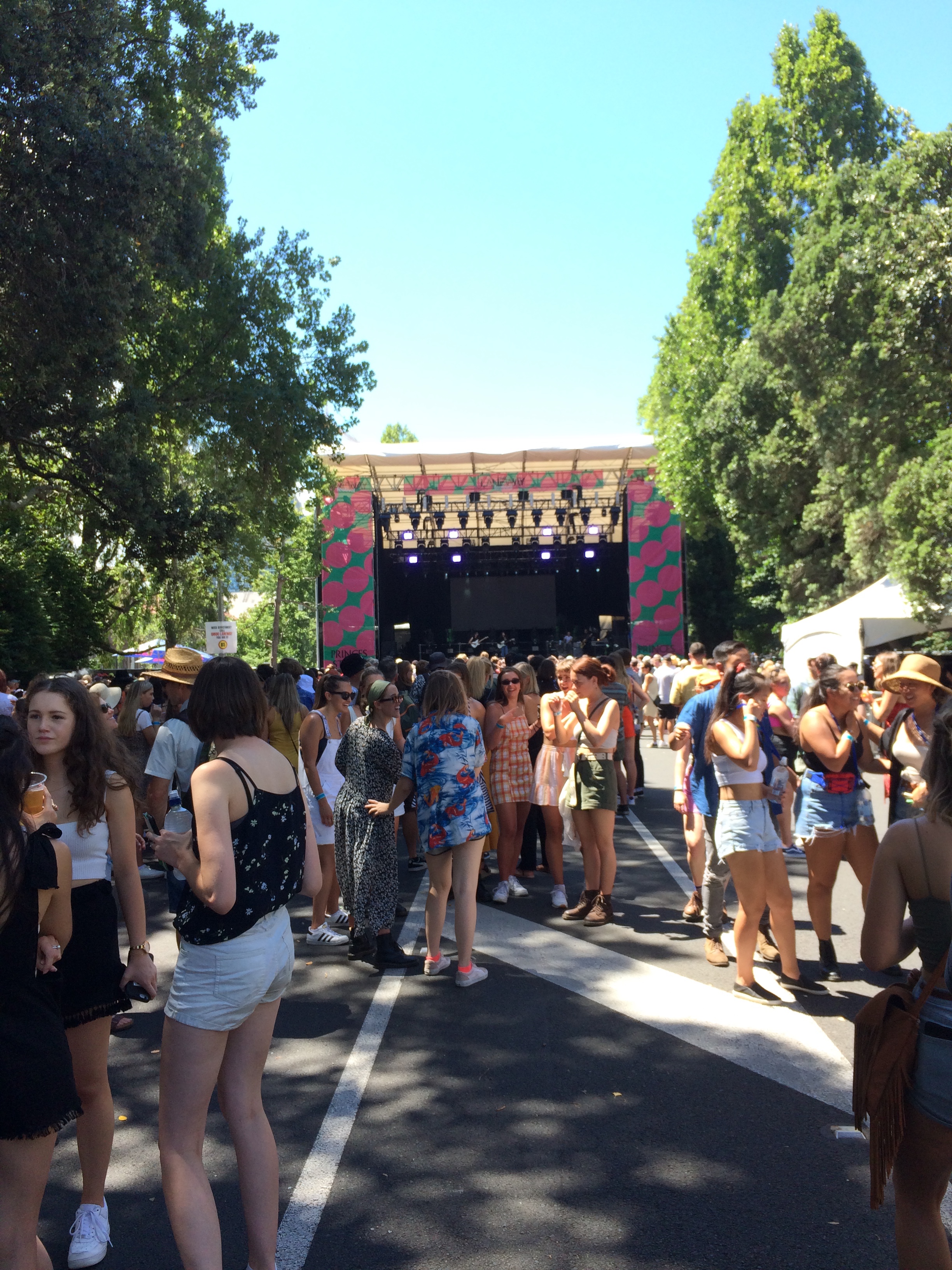 The Laneway for many was not a place to see but to be seen, it wasn't – for most I am guessing – where new bands or artists would be discovered but where your Spotify playlist could be briefly made flesh when you paid attention to the song you liked. Or, more correctly with Spotify, were directed to like. (Yep, there's the cynicism now, folks.)
The Laneway for many was not a place to see but to be seen, it wasn't – for most I am guessing – where new bands or artists would be discovered but where your Spotify playlist could be briefly made flesh when you paid attention to the song you liked. Or, more correctly with Spotify, were directed to like. (Yep, there's the cynicism now, folks.)
Yes, some acts had a core of people who knew every lyric but it seemed to me most were just obliged to go through the motions for a crowd which, after a couple of openers, were more interested in their friends, a group photo, a selfie, queuing for drinks or food, and . . .
For the most part Parquet Courts – whom I like – seemed to be emblematic of that. They were good but often quite lifeless. One Laneway too many for them, I think.
Because I'd seen the big names Courtney Barnett and Florence+Machine previously – and frankly couldn't be bothered waiting for Denzel Curry who did interest me – I left earlier than I ever have from a Laneway.
By the late afternoon there were visibly more people affected by the combination of sun, anticipation and alcohol than I'd seen in previous years. I didn't fancy waiting around to see what the evening might . . . throw up.
Music festivals may have always been less about the music than the chance to hang out with friends, but I don't think so.
Sitting right at the back of a Sweetwaters on a hill, halfway down in front of a Big Day Out mainstage or even at previous Laneway festivals, it always seemed to me that people were there for the whole set.
This time I did not get that impression.
Music has become much less important in the lives of young people – we know that – but it seemed to me that this very well organised Laneway was an expensive way to catch up with friends.
However that's just me . . . and I'm the one about 30 years ago who thought it would be fun to send along a sixty-something to review a Stones show.
I became that person . . . so my opinion isn't worth much.
I wasn't jaundiced or cynical and remained sober . . . but I couldn't get much satisfaction.

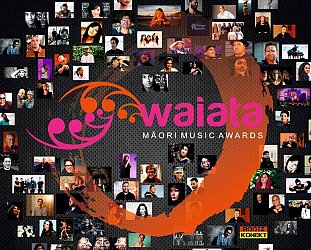
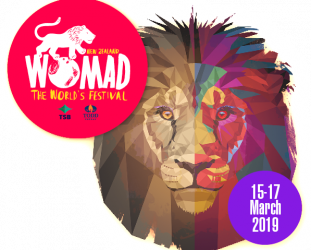


Steve - Jan 30, 2019
Observations from another outside the Laneway demographic.
SaveFestivals are increasingly more about the event than live musical performances for the digital generation. We observe that the importance of listening to the artist's body of work is diminishing as the medium of music distribution changes to resemble a liquorice-allsort-dispenser.
From the other side of the microphone, festivals are also particularly problematic for visiting artists (short sets don't suit most big acts, hanging around & waiting to perform a 45min set in the late-afternoon heat & following your exhausting 3 month tour is really-tough, most artists try to do a short version of their 'normal-act' & this doesn't always work).
Festival performances can be memorable and inspiring. When I call to mind the 'best' I've seen, they usually include elements of surprise/unexpected (invited/collaborating artist, unusual cover performance, strange-antics on stage, unusual response from audience, etc). Festival performances MUST take some risks to stand-out from the crowd.
I suspect we'll all continue to attend Festivals despite differing motivations, in various states of sobriety & we'll be both inspired and disappointed.
Kelvin Roy - Jan 31, 2019
Perhaps the majority of musicians/bands don't have a great understanding of music, or at least, live music. Which brings us to media...I would not generally deny the sincerity of people's motives, but people are prisoners of media and so is music.
Savepost a comment